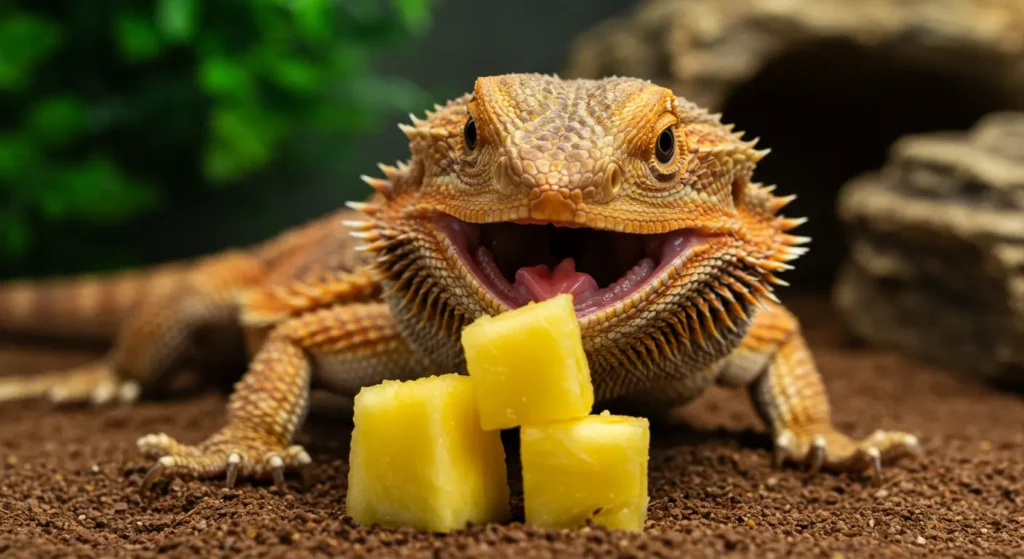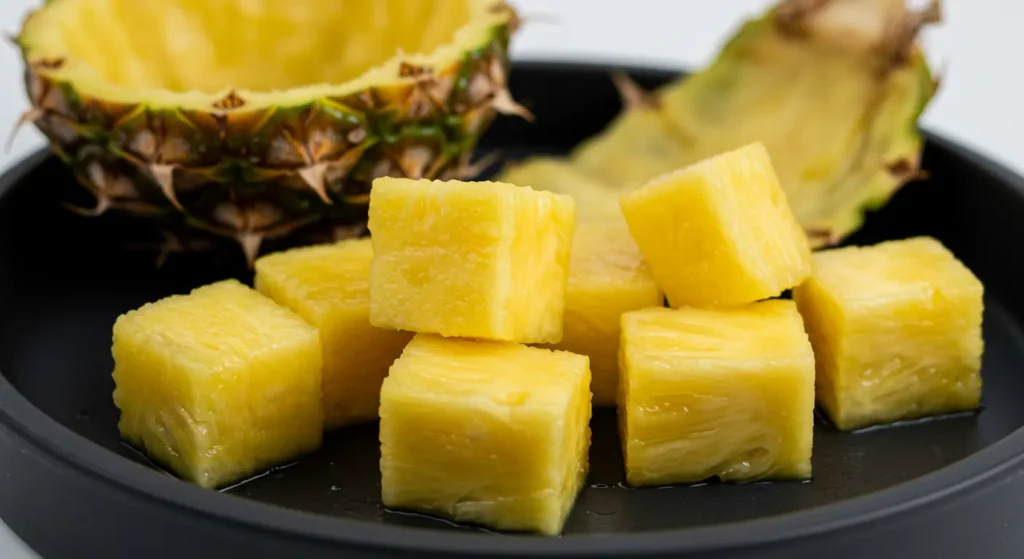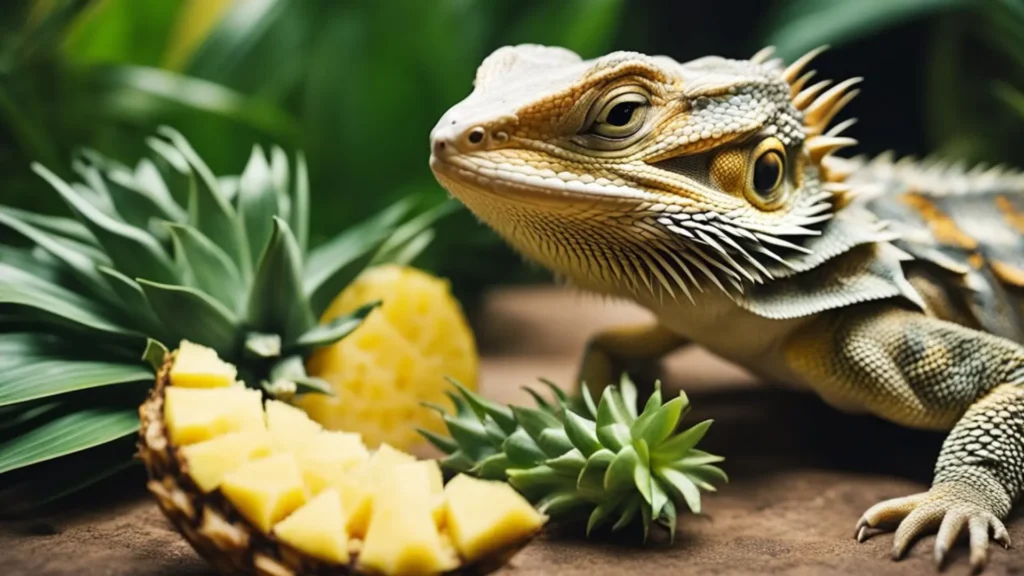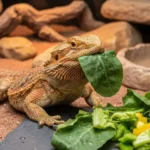Feeding your pet the right foods is essential to keeping them happy and healthy—especially when it comes to treats. So the burning question many reptile lovers ask is: Can Bearded Dragons Have Pineapple? Whether you own a rambunctious male bearded dragon or a gentle female bearded dragon, it’s important to know what’s safe in their diet.
In this quick guide, we’ll explore Can Bearded Dragons Have Pineapple—covering everything from nutritional benefits and digestive impact, to proper serving size and frequency. For more fruit ideas, check out Peaches, where we compare pineapple to other safe fruit options. We’ll also highlight differences in how juvenile and adult dragons, both male and female bearded dragons, may tolerate pineapple. By the end, you’ll understand when pineapple can be a fun, nutritious addition—and when it’s best left off the menu.
Let’s peel back the facts and find out just how “sweet” pineapple can be for your scaly companion.
Can Bearded Dragons Have Pineapple? Safety, Risks & Digestive Impact
Before adding any new food to your dragon’s diet, it’s vital to understand the safety profile and potential side effects. In this section, we’ll examine key risks—like digestive upset and nutrient imbalance—and explain exactly how pineapple may impact your pet’s health.
Pineapple nutritional content – sugars, vitamins, fiber & acidity
Pineapple is naturally sweet, containing the simple sugars glucose and fructose, which provide quick energy. It’s also a good source of vitamin C—a powerful antioxidant—as well as essential minerals like manganese, which supports metabolic health and bone development. The fruit’s dietary fiber encourages healthy digestion by aiding intestinal motility, yet excessive fiber intake can lead to loose stools or temporary digestive upset in bearded dragons. Pineapple’s acidity, with a pH around 3–4, means it can irritate a reptile’s sensitive gut lining if consumed too frequently or in large amounts. While occasional small portions offer nutritional perks, overfeeding can create digestive disturbances. Understanding these balance points—sugar for energy, fiber for digestion, and mindful acid intake—helps ensure you feed pineapple safely and effectively to your scaly friend.
How pineapple affects reptile digestion – enzymes, gut health, pH
One unique feature of pineapple is bromelain, a proteolytic enzyme that helps break down protein molecules. In controlled small amounts, bromelain can support digestion in bearded dragons by aiding nutrient absorption. However, high levels of bromelain or excessive acidity may negatively affect the gut environment, potentially disrupting the balance of beneficial gut flora. A stable pH in the digestive tract is vital for enzyme function and bacterial health. When the gut becomes overly acidic or alkaline, it can hinder digestion and nutrient uptake. Feeding pineapple in moderation—such as a small diced piece once a week—helps maintain optimal pH balance and supports healthy gut flora. This helps preserve overall digestive health while harnessing pineapple’s enzymatic benefits without causing imbalance or irritation.

Health issues bearded dragons might experience – diarrhea, calcium‑phosphorus imbalance
Feeding too much pineapple can lead to noticeable digestive issues, with diarrhea being the most common problem. The combination of high sugar content and natural acidity may overwhelm a dragon’s digestive system, leading to soft or watery stool. Another concern lies in pineapple’s mineral ratio—it contains more phosphorus than calcium. Over time, a diet high in phosphorus and low in calcium can impair calcium absorption, potentially weakening bone structure and affecting growth. This is especially important in young or growing dragons and breeding males or females. To prevent these issues, pineapple should only make up a tiny fraction of the diet and be balanced with calcium-rich foods and supplements. By carefully managing quantity and frequency, you help safeguard both digestive health and skeletal integrity.
Signs of pineapple intolerance in dragons – vomiting, lethargy, stool changes
Bearded dragons with pineapple intolerance may display clear warning signs. One of the most obvious is vomiting or regurgitation shortly after feeding—this is a red flag that the food didn’t agree with their digestive tract. You may also notice lethargy or sluggish behavior, as discomfort can sap their energy. Appetite might decrease, with your dragon showing less interest in food overall. Stool inspection is equally important: look for changes in texture, like loose, watery, or unusually soft droppings. These indicate digestive upset and possible digestive enzyme or acid intolerance. If you see any of these symptoms after offering pineapple, stop feeding it immediately. Once symptoms clear, reintroduce cautiously and in smaller portions if desired. Persistent signs warrant a visit to a reptile veterinarian to rule out other health concerns.
Can Bearded Dragons Have Pineapple? Health Benefits & Nutritional Value
Pineapple isn’t just a tasty treat—it also delivers valuable nutrients that can support a bearded dragon’s well-being. In this section, we’ll examine how vitamin C, antioxidants, fiber, and hydration from pineapple can benefit your pet’s immune function, digestion, and overall health when fed appropriately.
Vitamin C, antioxidants & immune support
Pineapple is a rich source of vitamin C, a potent antioxidant that supports immune health in bearded dragons. Antioxidants help neutralize harmful free radicals. This reduces cellular stress and supports overall wellness. While dragons produce some vitamin C internally, dietary sources offer added protection. Feeding small pineapple portions a few times a month can boost immune function. Just be sure to complement pineapple with calcium-rich greens and occasional supplements. This balanced approach helps maintain health without relying solely on fruit.
Hydration & dietary fiber advantages
Pineapple is naturally juicy and helps support hydration. Proper hydration is key for digestion and skin health in reptiles. The fruit also contains dietary fiber, which aids bowel movement and gut motility. In moderation, pineapple can prevent constipation and promote regularity. However, too much fiber may soften droppings. Serve small, well-balanced portions to enhance hydration and fiber intake. This makes pineapple a helpful occasional addition—not a daily staple.
Enrichment: adding fruit variety to your dragon’s meal
Offering different fruits provides mental and dietary enrichment for bearded dragons. Pineapple introduces a unique texture, color, and taste that stimulates their curiosity. Variety in diet can prevent boredom and encourage natural foraging behaviors. Use fruit as a rare treat—only in small amounts. Rotate with other safe fruits to keep meals engaging. This strategy supports physical health and mental stimulation.
Pineapple vs. other safe fruits (mango, papaya, blueberry)
Compared to mango, papaya, or blueberries, pineapple offers higher acidity and unique enzyme content. Mango is higher in vitamin A and lower in acid. Papaya contains similar enzymes but is milder on the gut. Blueberries provide antioxidants with less sugar. When choosing fruits, consider sugar level, acidity, and digestive tolerance. Mix small servings of different fruits to balance benefits and avoid overfeeding pineapple. This ensures a diverse and gentle fruit diet for your dragon.
Can Bearded Dragons Have Pineapple? Prep Tips, Portions & Serving Size
Feeding pineapple safely means more than just offering a tasty cube—it requires proper preparation and portion control. In this section, we’ll guide you through choosing ripe fruit, prepping it correctly, and determining the right serving size and frequency to keep your bearded dragon healthy and happy. Let me know if you’d like help with internal links or further content!
Choosing safe pineapple – ripe, organic, pesticide‑free
Start by selecting ripe pineapple with a fresh aroma and bright green crown. Avoid underripe fruit—it can be too acidic and lack sweetness. If possible, choose organic pineapple to reduce pesticide exposure. Pesticides can harm your dragon’s delicate digestive system. Rinse any conventionally-grown pineapple thoroughly under cool water to remove residue. Prioritizing organic options gives you and your pet added peace of mind.
Prep guide: peeling, dicing, removing core
Begin by cutting off the top, bottom, and outer skin. Remove the tough eye-like bits left on the flesh. Then, slice away the fibrous core from the center—that part is difficult to digest. Dice the pineapple into tiny, dragon-friendly cubes—no larger than half a pea for juveniles. Uniform sizes help prevent choking and ensure proper digestion. Serve immediately to maintain freshness and nutrient value.
Correct portion size – adult vs. juvenile dragons
Adult bearded dragons (12–18 inches long) can have about one small dice (roughly one teaspoon). Juveniles need even less—around half a dice. Overfeeding fruit can lead to digestive issues and nutrient imbalances. Stick to minimal servings. This portion control supports overall health and diet balance.
Feeding frequency – how often can you offer pineapple?
Pineapple should remain an occasional treat. Aim for no more than once every one to two weeks. Too frequent fruit servings may disrupt gut health or calcium balance. Track your dragon’s response—if digestion remains normal, you can continue this light schedule. Always pair fruit treats with calcium-rich vegetables and supplements to maintain nutritional balance.
Can Bearded Dragons Have Pineapple? Balanced Diet & Feeding Guidelines
A well-rounded diet is essential for your bearded dragon’s long-term health—and pineapple should only complement, not replace, staple foods. In this section, we’ll explore how to integrate pineapple alongside greens, insects, and supplements to ensure your dragon receives balanced nutrition at every meal.
Integrating fruit into your dragon’s regular diet – greens, insects, calcium sources
Fruit like pineapple should complement—not replace—your dragon’s staple foods. A balanced diet includes a mix of greens (collard, mustard, dandelion), protein from insects, and calcium-rich items. Aim for a plate with 70–80% vegetables and 20–30% protein. Only a small fruit cube a few times a month is needed. Always serve fruit alongside calcium sources such as crushed cuttlebone or powdered supplements. This helps balance phosphorus from fruit and supports bone health. Mixing pineapple into fruit salads with leafy greens can also boost nutrient diversity without overloading sugar.
Supplementation essentials – calcium + vitamin D₃ importance
Pineapple lacks sufficient calcium. For bone and shell development, dragons need proper calcium-to-phosphorus ratios. Dusting insects and fruit with calcium powder prevents deficiencies. If your dragon lacks UVB exposure, a vitamin D₃ supplement is essential for calcium absorption. Use reptile-grade supplements with a correct dosage. Consistent supplementation supports healthy bone growth and energy levels.
UVB lighting’s role in nutrient absorption
UVB lighting helps your dragon synthesize vitamin D₃ naturally, which is crucial for calcium absorption. Without sufficient UVB, dietary calcium may not be fully utilized. Make sure your UVB bulb is rated for desert reptiles and placed correctly in the enclosure. Replace the bulb every 6–12 months, as UVB output declines. Verifying UVB levels supports overall health and prevents metabolic bone disease.
Monitoring growth, weight, and digestion over time
Track your dragon’s body weight weekly to ensure healthy growth or maintenance. Also monitor stool consistency after feeding pineapple—look for normal, firm droppings. Keep an eye on appetite and energy levels too. Any sudden changes in weight, digestion, or behavior warrant a diet adjustment. Logging these observations helps tailor feeding routines and ensures a well-balanced diet.

Can Bearded Dragons Have Pineapple? FAQ, Troubleshooting & Expert Advice
Baby vs. adult dragons – is pineapple okay at every life stage?
Bearded dragons go through different dietary needs as they grow. Babies and juveniles need high protein and calcium for rapid development. Fruit, including pineapple, should be offered sparingly—perhaps once a month in tiny, pea-sized bits. Adult dragons (aged 12+ months) can handle small fruit servings more often—typically once every one to two weeks. Make sure any pineapple serving is a tiny part of a balanced meal rich in greens and insects. Always prioritize protein and calcium over sugary fruit, especially in younger dragons.
What to do if your dragon gets sick after eating pineapple
If your dragon shows signs like vomiting, loose stool, or lethargy after eating pineapple, stop feeding it immediately. Ensure fresh water is always available, and observe your dragon carefully for 24–48 hours. Offer plain greens and insects to support hydration and nutrition during recovery. If symptoms improve within two days, reintroduce pineapple in even smaller portions later. However, if digestive issues persist or worsen, remove pineapple from the diet entirely and consult a reptile vet for guidance.
When to seek help from a reptile veterinarian
Certain symptoms require professional care. If your dragon experiences continuous vomiting, bloody diarrhea, severe lethargy, or refusal to eat for more than 48 hours, seek veterinary attention immediately. Reptile vets can check for dehydration, infections, or metabolic issues. Bring details about diet, enclosure conditions, and feeding frequency to help with diagnosis. Quick action improves outcomes and safeguards your pet’s long-term health.
Credible resources – care sheets, vet blogs, scientific studies
Rely on reputable sources for accurate care advice. Good references include care sheets from herp societies, vet-authored blogs, and peer-reviewed reptile nutrition studies. Examples include the Association of Reptile and Amphibian Veterinarians (ARAV), university extension reptile nutrition guides, and reptile-specific veterinary blog posts. These sources help you verify feeding recommendations and guide safe fruit integration. Bookmark trusted resources to stay informed and support your dragon’s care with science-based facts.
Conclusion
In summary, can bearded dragons have pineapple? Yes—with caution. Pineapple offers valuable nutrients like vitamin C, hydration, fiber, and enzymes that can enrich your dragon’s diet. However, its natural sugars, acidity, and phosphorus-to-calcium ratio mean it should only be offered as a rare treat.
To feed pineapple safely:
- Use pea-sized pieces for adults, even smaller for juveniles
- Limit servings to once every 1–2 weeks
- Always pair with staple foods—greens, insects, and calcium supplements
- Monitor health—watch for changes in digestion, energy, or stool
If you notice any adverse reactions, like diarrhea or lethargy, stop feeding pineapple and consult a reptile vet if needed. With smart preparation and portion control, pineapple can be a fun and healthy addition to your bearded dragon’s diet.






